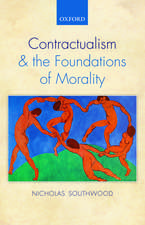Science and the End of Ethics
Autor S. Morrisen Limba Engleză Hardback – 12 mar 2015
| Toate formatele și edițiile | Preț | Express |
|---|---|---|
| Paperback (1) | 382.95 lei 6-8 săpt. | |
| Palgrave Macmillan US – 12 mar 2015 | 382.95 lei 6-8 săpt. | |
| Hardback (1) | 389.11 lei 6-8 săpt. | |
| Palgrave Macmillan US – 12 mar 2015 | 389.11 lei 6-8 săpt. |
Preț: 389.11 lei
Nou
Puncte Express: 584
Preț estimativ în valută:
74.46€ • 81.13$ • 62.74£
74.46€ • 81.13$ • 62.74£
Carte tipărită la comandă
Livrare economică 23 aprilie-07 mai
Preluare comenzi: 021 569.72.76
Specificații
ISBN-13: 9781137499844
ISBN-10: 1137499842
Pagini: 252
Ilustrații: IX, 238 p.
Dimensiuni: 140 x 216 x 16 mm
Greutate: 0.44 kg
Ediția:2015
Editura: Palgrave Macmillan US
Colecția Palgrave Macmillan
Locul publicării:New York, United States
ISBN-10: 1137499842
Pagini: 252
Ilustrații: IX, 238 p.
Dimensiuni: 140 x 216 x 16 mm
Greutate: 0.44 kg
Ediția:2015
Editura: Palgrave Macmillan US
Colecția Palgrave Macmillan
Locul publicării:New York, United States
Cuprins
Introduction: The Failure of Traditional Ethics PART I: THE END (DEMISE) OF TRADITIONAL ETHICS 1. What Kind of Ethics Does Science Call Into Question? 2. The Evolutionary Challenge to Moral Realism 3. The Neuroscientific Challenge to Moral Realism PART II: THE END (GOAL) OF TRADITIONAL ETHICS 4. Assessing the Empirical Case for Enlightened Self-Interest 5. Towards a Plausible Evolutionary Account of Altruism 6. Deciphering the Secret Chain 7. A New Age of Enlightenment or 'The End of the World'?
Recenzii
"Moral skepticism is an ancient idea, but the debate over its merits has been recently enlivened by a suspicion that scientific findings about the evolutionary sources of human moral thinking might somehow favor the skeptic's case. Stephen Morris stakes out a radical skeptical position boldly and clearly: science gives us strong reasons to doubt the existence of moral facts. But Morris's aims are ultimately constructive; in a sensitive and novel discussion, he provides suggestions as to how science could nonetheless help us to live more cooperative and harmonious lives." - Richard Joyce, Victoria University of Wellington, New Zealand
'This book offers a wide-ranging, accessible, interdisciplinary inquiry into the nature of morality. Without sacrificing rigor, Morris keeps his account grounded in the real world an accomplishment that's all too rare in contemporary ethics.' - Tamler Sommers, University of Houston, USA
'This book blends high theory with down-to-earth, empirically backed discussion of the practicalities of getting people to treat each other better for example, by promoting happiness so that people are more inclined to prosocial behavior. Stephen Morris has given us a provocative and engaging book that significantly advances the debate, and will interest a wide range of readers.' - Dan Haybron, Saint Louis University, USA
'This book offers a wide-ranging, accessible, interdisciplinary inquiry into the nature of morality. Without sacrificing rigor, Morris keeps his account grounded in the real world an accomplishment that's all too rare in contemporary ethics.' - Tamler Sommers, University of Houston, USA
'This book blends high theory with down-to-earth, empirically backed discussion of the practicalities of getting people to treat each other better for example, by promoting happiness so that people are more inclined to prosocial behavior. Stephen Morris has given us a provocative and engaging book that significantly advances the debate, and will interest a wide range of readers.' - Dan Haybron, Saint Louis University, USA
Notă biografică
Stephen G. Morris is Assistant Professor, in the Department of Political Science, Economics & Philosophy, College of Staten Island (CUNY), USA.

















